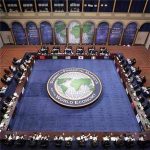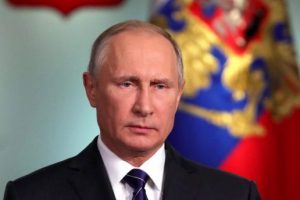FRANKFURT: At the European Central Bank, being a maverick means holding steady as others bow to the prevailing winds.
With its peers in the United States, Britain and Japan cranking up monetary printing presses in a bid to prevent their economies from falling into deeper holes, the E.C.B. is resisting the rush into the least orthodox central banking policies in contemporary history.
The European approach, to many outsiders and even some leading politicians like French president Nicholas Sarkozy, is hopelessly myopic and likely to leave Europe struggling long after others have resumed growth. But it has become the signature approach of the European Central Bank since credit markets first went into convulsions in August 2007 to think, before tearing up the rule book, not only about the acute crisis of the moment but what comes later.
“Exaggerated swings without perspective,” Jean-Claude Trichet, the E.C.B. president, said recently, “would delay the return of sustainable prosperity because they would undermine confidence, which is the most precious ingredient in the current circumstances.”
When others sharply cut interest rates, the E.C.B. was slower to act. When others stepped in to bail out financial institutions, the E.C.B., constitutionally limited in its powers, left that to national governments.
And now, with other central banks acting to create money out of thin air because they cannot prime the lending pumps by lowering short-term interest rates any further, the E.C.B. remains wary of the specter of future inflation.
Beneath it all is an aversion to anything that smacks of “printing money,” a phrase that evokes Europe’s worst economic nightmares, everything from kings debasing their currencies so they could fight endless battles to the hyperinflation and currency collapses in Germany after it lost two wars in the 20th century.
But in the view of its critics, the E.C.B. is underestimating the dangerous and unpredictable dynamics of the current recession, which has unfolded at lightning speed. With the all-too-real risk of being caught in a downward spiral, they say, the E.C.B. should be actively pushing cash into the economy now, as the U.S. Federal Reserve, the Bank of England, and the Bank of Japan are all doing.
“What they are doing is simply not enough, and this is not one of those downturns that you simply work your way through,” said Kenneth Wattret, chief euro-zone economist at BNP Paribas in London.
Another danger for the E.C.B., economists said, was that policies in Washington and London put pressure on the euro area via the exchange rate.
The euro has climbed about 10 percent against the dollar since the Fed policy was announced, the logical enough consequence of a decision to vastly increase the supply of greenbacks. It is also up sharply against the pound.
A sustained strengthening of the euro would price more European exports out of world markets as they recover, giving the American economy a significant leg up without any overt U.S. decision to devalue the dollar.
“You can’t suddenly start engaging in competitive devaluations of your currency,” said Erik Nielsen, chief Europe economist at Goldman Sachs. “But you can loosen monetary policy domestically, which has the same effect.”
With the E.C.B.’s benchmark interest rate at 1.5 percent, and probably headed lower next week, the overarching economic policy question in Europe has been whether the central bank in Frankfurt will join the worldwide move to buy financial assets — whether private bonds or government debt — as interest rates near zero. This policy is known as “quantitative easing.”
The E.C.B. has not ruled out such an effort, as Mr. Trichet has been careful to note repeatedly. For a variety of reasons, though, some of them institutional but others deeply buried in European culture and history, it is reluctant to emulate its peers.
The E.C.B. appears likely to lower interest rates further at its next meeting on April 2, most analysts believe, having shed previous qualms about pushing borrowing costs close to zero. And top officials have been hinting that the bank will also extend the length of loans it offers banks as part of its normal operations to ensure they do not get caught short of cash.
But the E.C.B. has thus far avoided anything resembling the Fed’s frenetic activism, which is viewed in Frankfurt as a desperate attempt to substitute for a lack of political will to fix the U.S. banking system.
The Fed is trying everything it can think of to infuse cash into the economy, bypassing the dormant financial system that is the gatekeeper of credit in normal times. It has purchased a dizzying array of securities, including government bonds whose rates influence lending costs throughout the U.S. economy. That is only necessary, in the view of some European officials, because repeated plans to restructure the banking system have failed.
Whether the latest plan, presented by Treasury Secretary Timothy F. Geithner on Monday, will fare any better remained an open question.
Mr. Trichet, though avoiding public criticism of the Fed and the U.S. Treasury, has said he is “deeply impressed” by European plans to recapitalize the banking system and guarantee certain transactions. “The central bank was not alone in tackling this financial and economic crisis,” he said.
E.C.B. officials also often argue that the financial system in Europe is different enough from the United States to undermine the effectiveness of quantitative easing.
About two-thirds of the credit in Europe is extended via bank loans, with the rest coming from debt securities. The United States is roughly the mirror image of Europe in that respect, giving the Fed reason to believe it can help by buying up securities.
The E.C.B. does not deny that Europe faces a painful recession. It is projecting the economy of the 16-nation euro zone could contract by up to 3.2 percent in 2009, while its best-case scenario for 2010 is an anemic 0.7 percent growth. Joblessness is expected to rise sharply.
Moreover, besides structurally weak economies like Ireland, Spain, Italy and Greece, the euro area is also grappling with a severe downturn in Germany, whose economy is shrinking because global demand for its merchandise has collapsed.
Morever, E.C.B. officials do not share the fear of deflation — a sustained drop in prices across the board — that lurks behind the Fed’s actions.
The E.C.B. is projecting progressively lower inflation rates for 2009 and 2010 that are below its rough goal of 2 percent, but not dangerously so. This, bank officials like to point out, is helpful as it raises the purchasing power of European citizens.
This process of disinflation “should not be confused with another ‘d’-word, namely deflation,” Jürgen Stark, a member of the E.C.B.’s executive board, said in a recent speech. “From a conceptual point of view, deflation is a completely different state.”
But Europe, particularly Germany where the E.C.B. is based, is still a place where the fear of inflation is never far from the surface, even as economists debate whether prices will fall or merely hold steady.
The Fed’s move last week to pump up to $1 trillion more into the financial system led Bild, the best-selling German tabloid newspaper, to run alarmed headlines about an “inflation danger” that now stalks Europe. Exaggerated as that may be, the Fed’s actions sent shivers through an institution whose chief mandate is to protect the purchasing power of the euro, which is only 10 years old.
Right after the Fed acted, commodity prices, the classic harbingers of future inflation, ticked sharply upward, while the dollar fell, suggesting investors see a not-so-subtle future debasing of the U.S. currency.
Carter Dougherty
sursa: www.iht.com












Adauga comentariu